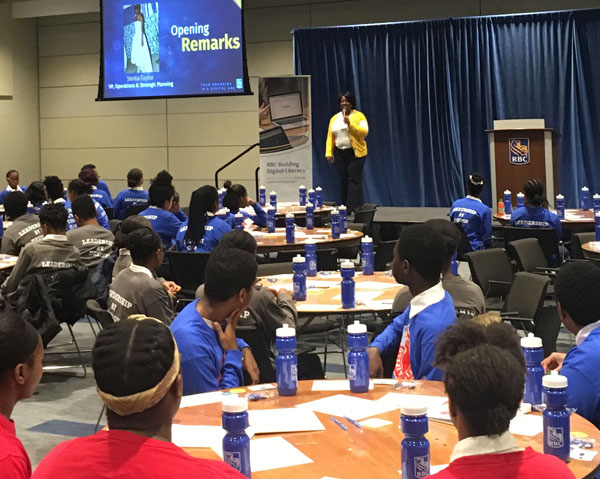TORONTO, Ontario December 13, 2018 — Seventy-five African-Canadian high school students of the Leadership by Design (LBD) program, the signature initiative of the Lifelong Leadership Institute (LLI), recently participated in a free, digital, literacy workshop, hosted by the Royal Bank of Canada (RBC), Canada’s largest bank.
On December 1, the grades 10 to 12 students gathered at the RBC Waterpark Place Auditorium on Queens Quay, West, in downtown Toronto, for a hackathon entitled “Hacker, Hipster, Hustler – Discover Your Tech Identity”, hosted by the RBC Building Digital Literacy program.
While students were learning design and coding concepts and the importance of digital literacy, to help them build skills for the future of work, their parents participated in a panel discussion, “Future of Work”, with RBC leaders.
In 2016, the Information and Communications Technology Council (ICTC) published “Digital Talent: Road to 2020 and Beyond”, Canada’s first national, digital, talent strategy, which indicated that there will be a demand for over 200,000 information and communications technology workers in Canada, by 2020.
Coached by RBC volunteers, the students were organized in teams to create an app or a website that digitally brands a consulting agency of their own design.
In a showcase arcade, they had to present the idea for their app to their parents, volunteers and RBC judges. The judges selected the top three student teams — StUdios, Best Self, and Smart Search – for the RBC Dragon’s Den Pitch.
Most of the apps focused on tutoring, providing advice for youth on various matters, self-esteem and mental health.
The team of “Best Self” created an app that offers mental health help to students, and was declared the winner, with each member receiving a $50 Visa gift card. Each member of the other teams in the finals received a $25 Visa gift card.
“I was really impressed with the presentations. I was expecting a lot and I got a lot — and even more,” said Senta Taylor, Vice-president, Operations and Strategic Planning at RBC, who sponsored the event.
She said parents and the RBC volunteers were impressed with what they saw, and some parents were surprised that their child could do what they created at the workshop.
Taylor said last year RBC did over 50 events, and this year had already done over 50,000 hours of coding events and partnerships, across North America.
“We look forward to doing more next year – more than 50,000 hours worth of volunteer partnership events. We’re committed to our theme of making communities prosper, and so this is all about instilling in our youth the skill sets and mindsets that are needed for the future. And so, that’s the reason why partnerships like this, and being involved in events like this, are things that we’ll continue to do,” she said, noting that it is a core part of how RBC wants to give back.

Senta Taylor, Vice-president, Operations and Strategic Planning, RBC, who sponsored the event, welcomes the students, their parents and volunteers to the hackathon on Saturday, December 1, 2018.
The vice-president said she was inspired about the possibilities and the hope of the future leaders in the room.
She added that the creativity, engagement of the students and parents, and the ideas that, in two hours, the students presented, gave her much hope.
Taylor said these types of events inspired her “about the future of Canada and our youth in this country, and how a small investment can create such excitement, and hope, and possibility in the eyes of the students”.
The Building Digital Literacy program was created by RBC to empower communities, through the extension of digital literacy skills and knowledge to youth and adults.
Its mission is to “stimulate interest in technology careers, by showcasing a wide variety of skills that are required in finding employment in today’s digital era, while also emphasizing the importance of acquiring a fundamental understanding of technology in all careers”.
The LBD program provides leadership development, career development and a range of personal growth opportunities to African-Canadian students, who are enrolled in high schools, across the Greater Toronto Area.
It is a multi-year commitment that provides programming, throughout Grades 10, 11 and 12, and thereafter throughout students’ university/college years.
During the “Future of Work” panel discussion, parents heard from the following RBC employees: Pennie Santiago, Senior Director, End User Experience; Teri Dennis-Davies, Vice-president and Head of Human Resources, Investor and Treasury Services; Leona McCharles, Vice-president, Global Recruitment; Alex Peh, Vice-president, Innovation; Mark Beckles, Senior Director, Youth Strategy and Innovation; and Denise Pratt, Director, Awareness and Education, Cybersecurity.
Peh said the human element is important in the future of work, even as technology advances in workspaces.
He noted that empathy is important and underscored the need, for what he called, an empathy boot camp.
Peh observed that artificial intelligence cannot empathize, and that a computer does not understand what is good and can discern someone’s mood. The vice-president of innovation said humans will always be able to do things that technology cannot.
RBC has a $500 million, 10-year commitment that it has made, through its Future Launch, to help young Canadians prepare for “a drastically-changing workforce”.
The parents were told that it was important for students to have a co-op experience or apprenticeship before they leave high school, and that young people need to have access to mental health supports.
Trevor Massey, Chair of Lifelong Leadership Institute, commended the students on seizing the important learning opportunity by being there on a Saturday morning, and being punctual. He said the students did not just learn about coding, but about collaborating and teamwork.
The LLI’s goal is to inspire leadership and develop leaders in the Black community in the Greater Toronto Area.
 Pride News Canada's Leader In African Canadian & Caribbean News, Views & Lifestyle
Pride News Canada's Leader In African Canadian & Caribbean News, Views & Lifestyle





